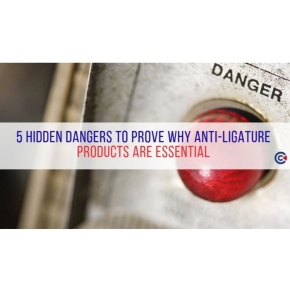
Hidden dangers to prove why anti-ligature products are essential
Contour explores some of the less-obvious dangers that’ll prove why anti-ligature products are an essential resource.
It’s a sad fact that those receiving psychiatric treatment are often looking for opportunities to self-
harm, or worse. Every inch of a room is considered as a means to cause damage to themselves or
the environment around them. The result of this has led designers, architects and ward managers to consider ligature risks when re-designing or upgrading a mental health facility.
Here are eight hidden dangers that prove why anti-ligature products are essential:
1. Weaponisation
Many Service Users will look to vandalise furniture to an extent where they can make weapons for self-harm, or demonstrate anger and frustration to others. This can be made easier for the Service User if there are ligature points, or poorly made and outdated furniture. Anti-ligature products provide robust casings around some of the key ligature points found in mental health facilities. These include radiators, light switches, and televisions.
2. Ligatures Below The Head
It’s very easy to assume that hanging takes place above head-height. Whilst this is very true, studies show around 50% of hanging suicides are not fully suspended—ligature points below head level are commonly used.
The Care Quality Commission highlights that the risk posed by a ligature point is greater if the ligature point is between 0.7 metres and 4 metres from the ground, further demonstrating that ligatures which are not fully suspended pose the same risk to those which are.
We’ve found that even ligatures below 0.7 metres pose a danger, which is why it’s worth assessing furniture legs.
3. Electrocution
The term ‘anti-ligature’ speaks for itself, but many anti-ligature products provide protection for common electrical products, such as televisions and light switches. Those anti-ligature electrical products therefore serve as a double-edged safety measure, minimising the risk of Service Users attaching ligatures, whilst preventing electrocution if certain products are tampered with.
4. Gaps
Whilst some furniture may not appear to have any obvious ligatures, a lot of fixed furniture can have gaps around joints. This makes attaching a thin cord fairly straightforward, and thus increases the risk of self-harm or suicide.
Gaps from fixed furniture to wall, or from an uneven wall is also a hidden danger to be aware of, particularly behind radiators. In this event, ensure that installers use anti-pick mastic behind the fixed furniture. This will minimise the opportunity for individuals to secure a ligature.
5. Pipework
This links with ligatures being below head-height, as mentioned previously. We have found that older buildings sometimes contain exposed pipework, which is an obvious ligature risk, despite not being as noticeable as bed-posts or shower rails. Pipework can be covered with a range of anti-ligature casing options to minimise the risk caused by exposed pipework.
To conclude, in order to truly minimise the potential ligature risks in a mental health setting, designers, architects, and ward managers need to place themselves into the shoes of someone with deep-rooted mental health issues.
This isn’t an easy task, and anti-ligature measures will evolve as awareness develops and technology
advances. Not all ligature points are obvious, which is why it’s important to be aware of those hidden, less obvious dangers.
Contour can be contacted at;
The Mansions
43 Broadway
Shifnal
TF11 8BB
Tel: 01952 290 498
Email: sales@contourheating.co.uk
Visit Supplier's page
Latest news

29th April 2025
Senior pledges to ‘bee’ part of the solution with new biodiversity initiative
Senior Architectural Systems has installed its first on-site beehive, marking another step forward in its commitment to sustainability and biodiversity.
Posted in Articles, Building Industry News, Building Products & Structures, Building Services, Curtain Walling, Doors, Glass, Glazing, Innovations & New Products, news, Restoration & Refurbishment, Retrofit & Renovation, Sustainability & Energy Efficiency, Walls, Windows
29th April 2025
West Fraser range delivering key benefits for South-East carpentry company
An experienced carpenter and building site manager who has recently set up his own company is using high performance panel products from the West Fraser range.
Posted in Articles, Building Industry News, Building Products & Structures, Building Systems, Case Studies, Garden, Restoration & Refurbishment, Retrofit & Renovation, Sustainability & Energy Efficiency, Timber Buildings and Timber Products
29th April 2025
CPD Courses Available Online From Ecological Building Systems
Ecological Building Systems, a leading supplier of natural building products for sustainable construction, has revealed its comprehensive CPD programme for the year ahead.
Posted in Articles, Building Industry Events, Building Industry News, Building Products & Structures, Building Services, Continuing Professional Development (CPD's), Information Technology, Innovations & New Products, Insulation, Restoration & Refurbishment, Retrofit & Renovation, Seminars, Sustainability & Energy Efficiency, Training, Walls, Waste Management & Recycling
29th April 2025
WindowBASE launches new prospect databases at FIT Show
Visit WindowBASE at the FIT Show to see first-hand how it helps companies find new customers – the company is launching an easy-to-use, intuitive platform on Stand G16 at the NEC Birmingham from 29th April – 1st May.
Posted in Articles, Building Industry Events, Building Industry News, Building Products & Structures, Building Services, Doors, Exhibitions and Conferences, Glass, Glazing, Information Technology, Innovations & New Products, Posts, Publications, Research & Materials Testing, Restoration & Refurbishment, Retrofit & Renovation, Windows
 Sign up:
Sign up: